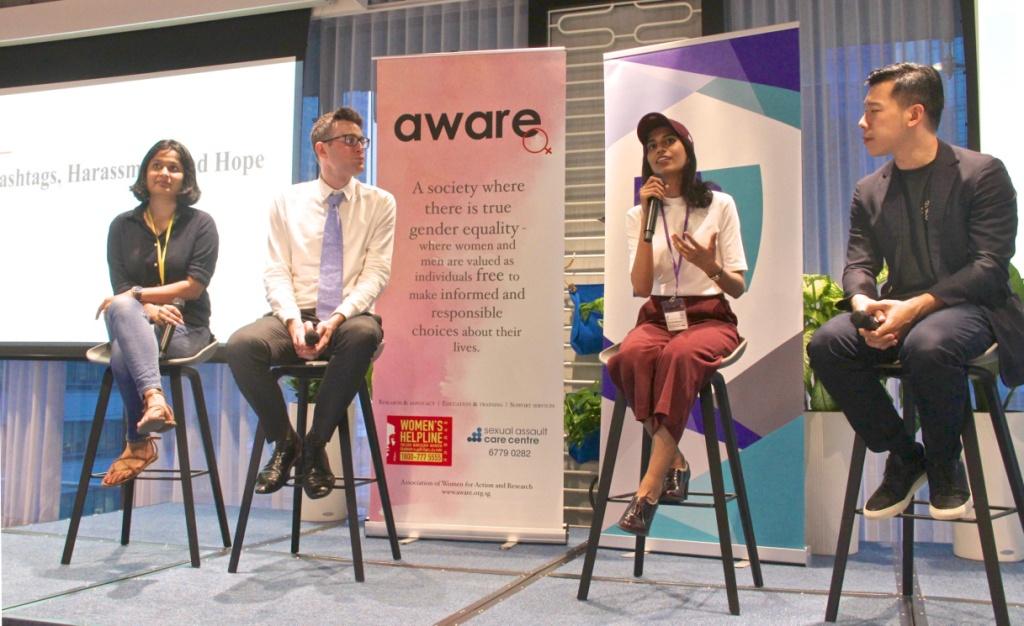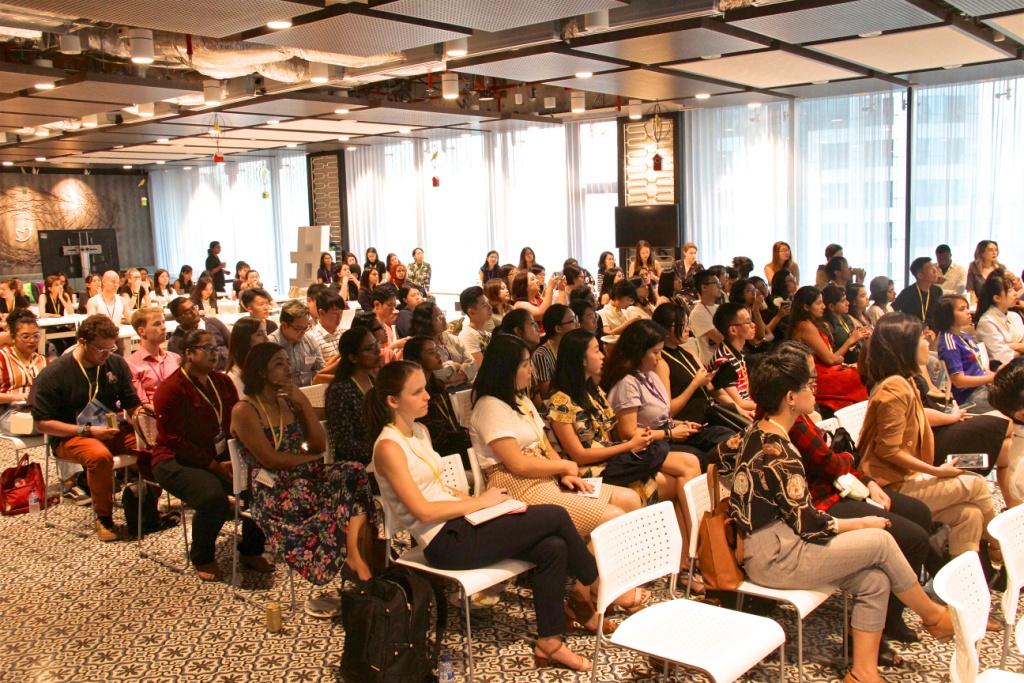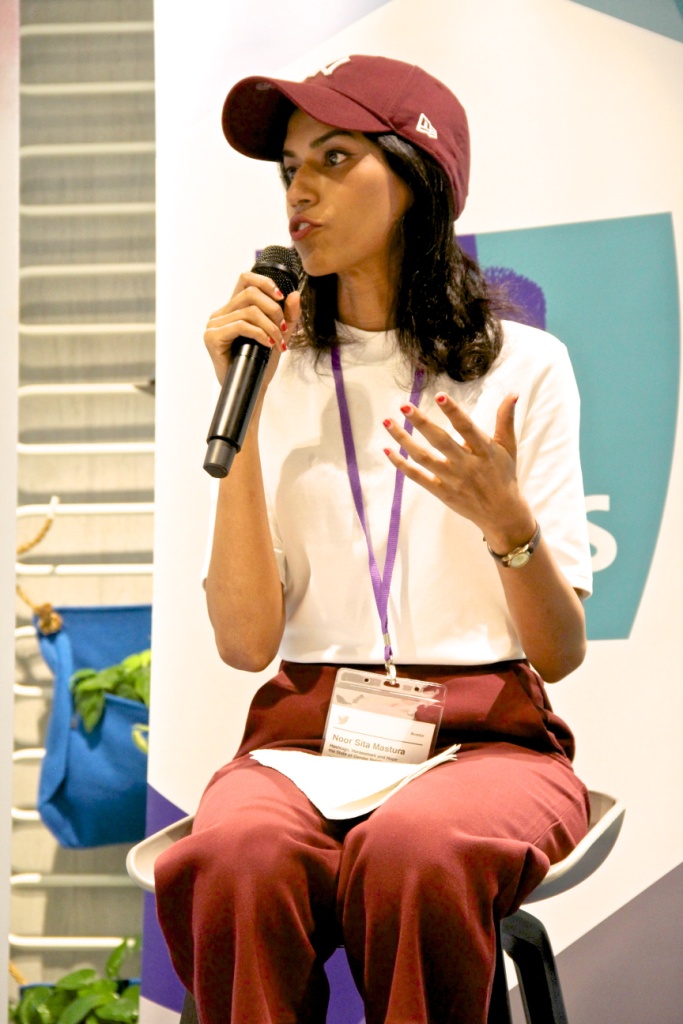-
Advocacy Theme
-
Tags
- Abortion
- Adoption
- Caregiving
- CEDAW
- Disability
- Domestic Violence
- Domestic Workers
- Harassment
- Healthcare
- Housing
- International/Regional Work
- Maintenance
- Media
- Migrant Spouses
- Migrant Workers
- Muslim Law
- National budget
- Parental Leave
- Parenthood
- Polygamy
- Population
- Race and religion
- Sexual Violence
- Sexuality Education
- Single Parents
- Social Support
- Sterilisation
- Women's Charter
A Recap: Hashtags, Harassment and Hope: the State of Gender Relations in Singapore
March 15th, 2019 | Gender-based Violence, News, Workplace Harassment

Written by Alissa Baer, AWARE research consultant
“The #MeToo movement is about having a conversation on core issues, wherever we are. It’s about creating spaces to talk about thorny issues,” said Shailey Hingorani, AWARE’s Head of Research and Advocacy.
She was speaking at “Hashtags, Harassment and Hope: the State of Gender Relations in Singapore”, a presentation and panel discussion on the evening of 13 March at Twitter’s Singapore headquarters.
The week after International Women’s Day, AWARE, market research company Ipsos and self-described “serial social activist” Siti Noor Mastura came together with Twitter for a discussion encompassing the #MeToo movement, harassment in the workplace and at home, and ways for society to move forward. It’s been more than a year since #MeToo took off on social media around the world, enabling survivors of sexual violence to come forward and speak about their experience. The impact of the movement in Singapore, however, might not seem as obvious and visible as the impact in other countries.
Robert McPhedran, Ipsos’s Associate Research Director of Public Affairs, shared the company’s new findings on public attitudes towards gender equality in Singapore, based on a survey of more than 1,000 people. The issues covered in the presentation on Wednesday ran the gamut, from perceptions of the gender pay gap and glass ceiling, to sexual harassment and victim-blaming.
Perhaps unsurprisingly, gender and age often had a stark impact on an individual’s responses to the survey, Rob said. The respondents’ attitudes towards political correctness, for example, differed amongst generations: Almost 40% of respondents agreed with the statement that Singaporean society is too politically correct. Younger respondents (aged 30-49) were more likely to agree with this statement than older respondents, which Rob posited was due to greater social media exposure amongst younger generations.

Where the results got more interesting, though, were in responses that didn’t see an expected gender differential. For example, 34% of respondents believe that false accusations of sexual assault are a bigger problem in our society than unreported acts of sexual assault—a statistic that evoked gasps and hisses from the audience. (In reality, most sexual assault survivors—7 in 10—do not file a police report.) For this result, Rob said, there was no significant difference between male and female answers.
At the same time, sexual harassment was selected by respondents as the second most important issue facing women and girls in Singapore today. These apparent contradictions might reflect a larger lack of understanding about harassment in the first place—a lack that, Twitter Public Policy Manager Philip Chua added, is not unique to Singapore. There is overall not enough worldwide information on these topics, he said, and even when some exists, “not enough has been made of it.”
When Noor Siti Mastura (the recently crowned winner of The Straits Times’ Singaporean of the Year 2018, and co-founder of non-profit organisation Interfaith Youth Circle) spoke, she shared her own experience of childhood sexual abuse for the first time in public, leaving the audience in tears.
Noor explained how the #MeToo movement helped her to come forward about her sexual assault (even though she admitted, to laughter, “I don’t have a Twitter account—I’m going to make one later!”). On the one hand, she initially hesitated to share her experience, citing a feeling that her stories “weren’t bad enough” compared to others’; a worry that by speaking up, she would be “just seeking social media attention”. On the other hand, “because of the #MeToo movement, there was a lot of educational information [available] as well… for the first time, I didn’t brush it off. The reality sank in that [sexual assault] happened to me.”
Although her experience of abuse was “so heavy” of a topic to share with “complete strangers”, Noor asked: “How do I expect my community to do this if I don’t?”

She vowed to keep shining a light on abuse within the Indian and Malay communities she works with, emphasising that education from an early age is key. At one point, Noor asked the room for a show of hands: Who had been taught as children about “good and bad touch”? Approximately 20 hands went up in a room of 120. This proved her point: “Most kids, when touched in the wrong places, don’t know what is happening. We don’t speak to our kids enough about this.”
While #MeToo has given survivors a platform, the panellists highlighted that the social movement did not come out of nowhere—the battle for women’s rights has been bitterly fought for centuries. “#MeToo is a cultural moment,” Shailey reminded, “but not a frame in which all women’s rights movements apply.” Also, “#MeToo fundamentally relies on survivors doing all the work… to relive their trauma so they can convince you that sexual harassment is a problem in our society,” she added. It should therefore not be “the be-all and end-all of conversations about gender”.
So—now that we have some data—what can we do? Many in the audience wanted to know.
Shailey spoke about Aim for Zero, AWARE’s ongoing national campaign to end all forms of sexual violence, including child sexual abuse, workplace harassment and sexual assault in public areas. Aim for Zero encompasses sexual assault awareness and sexual assault first responder trainings by AWARE’s Sexual Assault Care Centre, as well as anti-workplace harassment trainings by Catalyse Consulting, and a series of sex education workshops called Birds & Bees.
As members of the public, we can do better to provide support for survivors. As Noor poignantly explained, when sexual violence happens to you, “all you need is someone telling you, ‘I’ll walk you through this.'”
“We have to actively seek out these opportunities,” Shailey concluded, “not be complacent about the knowledge we already have about sexual harassment.”
Photographs courtesy of Ipsos.



